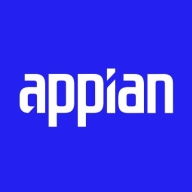

Appian and AgilePoint are both key players in the low-code application development market. Appian has an advantage with its strong integration capabilities, while AgilePoint is preferred for its extensive customization options, particularly for enterprises with specific needs.
Features: Appian is valued for its process automation platform, integration with various enterprise apps, and robust process design. AgilePoint offers flexible application integration, a strong process modeling engine, and a user-friendly design environment.
Room for Improvement: Appian's areas for enhancement include giving more customization options, reducing setup complexity, and improving pricing transparency. AgilePoint could improve in documentation quality, expand pre-built connectors, and advance integration with emerging technologies.
Ease of Deployment and Customer Service: Appian ensures a straightforward deployment process supported by a robust support network, making problem resolution efficient. AgilePoint offers an adaptable deployment model that suits diverse IT environments and provides responsive customer service, tailoring to various business needs.
Pricing and ROI: Appian has higher initial costs but promises significant ROI through process efficiency and scalability. AgilePoint's lower setup costs make it attractive for budget-conscious companies while maintaining competitive ROI through customization and flexibility.
| Product | Market Share (%) |
|---|---|
| Appian | 5.3% |
| AgilePoint | 0.8% |
| Other | 93.9% |


| Company Size | Count |
|---|---|
| Small Business | 20 |
| Midsize Enterprise | 9 |
| Large Enterprise | 41 |
AgilePoint NX is a top-five low-code platform that empowers you to quickly build anything from simple eforms and workflows to complex, multi-tenant SaaS apps, IoT apps, and composite LOB systems without writing code and at a price almost any enterprise can afford.
Appian is a unified low-code platform and solution used by businesses to build enterprise applications and workflows. This product adapts to the needs of clients and the technologies they are already using to combine their data in a single workflow and maximize resources. The platform has four main components through which it transforms the work process for companies of various sizes. They are:
Appian is utilized across a diverse set of industries, including automotive and manufacturing, energy and utilities, education, financial services, telecom and media, transportation, retail, insurance, healthcare, and life sciences. The most frequent use cases of Appian are customer journey, governance, risk and compliance, operational efficiency, supply chain, distributed order management, and environmental, social, and governance (ESG) management.
Appian Features
Appian has various features that allow users to create solutions for their businesses. These features can be separated into a few groups according to function, including automation, low-code application development, and integrations and data. Some of the most frequently used features of Appian include:
Appian Benefits
The benefits of using Appian include:
Reviews from Real Users
A practice leader - digital process automation at a computer software company values Appian highly because the product is easy to develop, low-code, and has a good user interface.
Alan G., an advisory board member at Codecon VR, Appian offers a clear application life cycle, easy to learn documentation, and comes with a fundamentals course.
We monitor all Business Process Management (BPM) reviews to prevent fraudulent reviews and keep review quality high. We do not post reviews by company employees or direct competitors. We validate each review for authenticity via cross-reference with LinkedIn, and personal follow-up with the reviewer when necessary.